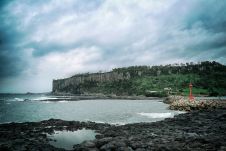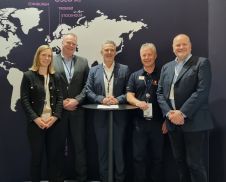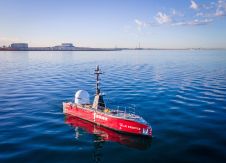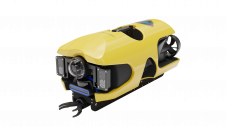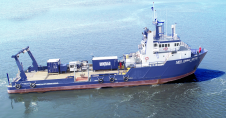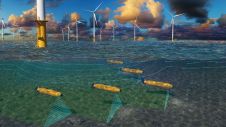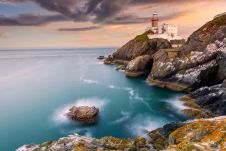Europe Can Take Maritime Lead
Ian Shepherd is the EU Ambassador of the Sea.
In this capacity, he is working to improve maritime co-operation within Europe by formulating a maritime policy. Hydrointernationalhas taken the opportunity to interview him, while of course paying attention to the hydrographic perspective on this continent.<P>
Please introduce yourself toour readers.
Born in Glasgow, I was brought up in a family heavily steeped in shipbuilding and it was little surprise when I decided to go to the Britannia Royal Naval College. I spent 21 years in the Royal Navy, specialising in Underwater Warfare and Navigation and have subsequently worked in the oil and gas industry, shipbuilding as a Trials Master, marine consultancy and fishery protection, and I now run a defence and marine equipment manufacturing company. All told, I have spent 35 thoroughly enjoyable years in what I consider to be the best industry in which to make alifelong and varied career.
You have the title of EU ambassador for the Sea. What is your role and position as ambassador?
The role of ‘Ambassador of the Sea’ is to promote excellence in maritime affairs and to help clarify and explain the concepts and ideas put forward by the Commission, thus helping to inform national and regional debate. I also consider it very important to help keep a focus on our industry in the wider forum.
Why does Europe need an integrated maritime policy (IMP)?
The concept of an IMP is not new; it is, after all, what the IMO has been striving to achieve on the international stage for many years. Clearly, the behaviour of one nation towards its seas will impact on its neighbour; the IMP provides a real opportunity to work to a common set of ideals and significantly increase co-operation, allowing us to preserve the maritime space in a productive and sustainable manner. Sadly, in these times, security has become a major issue and a high level of integration will be required in the development of protection systems.
Do you see the IMP published by the EU as a regional implementation of the UNCLOS?
UNCLOS is a very wide-ranging agreement, which the IMP complements and in some areas moves forward with new ideas. I would not describe it as the EU implementation; however, the final document may help clarify aspects that are difficult and will assist implementation in some areas.
In the IMP, there are a few references to IMO Conventions (STWC and Annex VI of MARPOL). Does the EU Commission intend to co-operate even closer than it does nowadays, with that UN specialised agency?
The Commission is monitoring the current discussions on Annex VI and clearly, given our technical base in Europe, is capable of informing the debate. I see no reason why the EU should not take a lead in this area – the development of new technologies to reduce pollution could benefit industry. Promoting the use of shore power for ships in harbour is an example of how Europe might promote a greener policy. I feel that co-operation on STCW is currently good; however, we need to examine areas such as the skills passport to gain the maximum benefit and flexibility from our workforce whilst recognising that our seafarers in turn need flexibility in how and when they work.
Maritime spatial planning and integrated coastal zone management (ICZM) are important for the sustainable development of marine areas and coastal regions. How does Europe plan to facilitate spatial planning and ICZM between EU member states and on an international level?
The debate on spatial planning continues; what we do know is that access to the sea for marine activities is a precious commodity that has evolved rather than been planned in the past. In the future, we need to think at least 20 years ahead, planning for what we need and ensuring that everyone who uses the seas has the correct access and infrastructure to sustainably support their activities. Where this involves common borders, inter-state co-operation needs to be at the forefront. Areas such as ArcManche already make such co-operation possible.
In your plan, you describe how the establishment of an appropriate marine data and information infrastructure is of utmost importance. What actions do you foresee being needed to achieve this infrastructure?
Again, there is much work to be done in this area; however, Europe boasts a number of world-leading institutions that gather and process marine data. Sharing data and rationalising effort has improved dramatically in recent years and I believe that the mechanisms are already in place to allow development in this area. Framework calls now and in the future will further aid the development of such infrastructure. A roadmap leading to an action plan will be produced.
Do you intend to connect to existing European data infrastructures (for example, MESH) or global marine data infrastructures?
We cannot work in isolation – the marine community has been global for a very long time and we need to continue to consider every source of data and its suitability. There will inevitably be considerable use made of existing infrastructures both in Europe and worldwide; however, they are many-fold, even at national level, and rationalisation is much needed. We also need to be aware of differing quality standards in existing structures.
Will those data be freely available to the private mapping and charting industry? Or will they be subject to copyright legislation? (Low-price quality data to mariners would enhance safety for the mariners and the environment.)?
From a personal perspective, I am extremely supportive of making high-quality data available to the mariner at the lowest possible cost. There are many arguments put forward, both for and against; however, I believe the benefits would outweigh the costs.
Today, there is a global shortage of people working in the marine sector. When we look at the vacancies and the demands for personnel at sea, surveyors are becoming the most-wanted specialists in the offshore world. What investments and actions does the EU foresee in attracting people to the marine industry?
Many different programmes have been implemented in the various member states to address the skills shortage within the industry. The first steps are being taken to review these national programmes to determine both best and most effective practice. This knowledge when shared can, I believe, allow us to make better progress and perhaps look in more detail at a Europe-wide ‘Skills Passport’. That said, I firmly believe that everyone in the industry has a part to play in encouraging our young people to consider the marine sector as their future.
In the IMP, it is said that “The Commission …. will prepare a database on Community funding available for maritime projects ….” Will that database contain a specific allocation of funds to enhance the hydrographic activities aimed at a fine description of the coasts and the seas surrounding the European continent?
There are already invitations to bid for framework funding that would assist in this area, as well as a number of embryonic projects in place. The hydrographic industry will play an important part in many envisaged future projects.
Economic growth is driven by research and development of new technologies. What kinds of important developments do you foresee?
There are a number of key areas where I believe we will see significant changes in the coming years - marinerenewable energy, increasing use of advanced composites, nano technologies and the increased use of space-based sensors. Marine and environmental sciences will also play a key part, and will drive the need for improved sensors and innovative deployment methodologies. Demands for improved surveillance and security equipment will also demand high levels of innovation. Reducing the carbon footprint of maritime transport will increase in importance and new technologies are already coming forward to address this issue. Finally, the exploitation of seabed resources at ever-increasing depths will demand significant advances in engineering and may well include carbon capture and storage.
What can the role of the IMP be in these developments?
I believe the EU already encourages high levels of innovation and there is evidence of increasing pan-European co-operation. I think that the IMP needs to both encourage and help facilitate some of the excellent work already taking place.
Can our readers contribute to the policy and actions you propose?
Readers should visit 8 1 to monitor the progress of the ‘blue paper’. Stakeholder participation is both encouraged and welcomed from individuals and organisations.
Is the wish for (space-based) AIS security driven or also safety driven? If the latter, should all ships carry active AIS?
Clearly, security is currently a prime mover; however, we should always be open to opportunities and, with technological progress, AIS clearly has a very important role to play in the future of maritime safety for all vessels.
The policy paper seems to be a good breeding ground for more rules, for example, to enhance safety. However, is there also a view on offered safety by the EU, for example, by means of offering back-up positioning in case of satellite positioning failures?
I, along with many other (ancient) mariners, have concerns over the increasing dependency on a single system. Technological advances have opened up other options and I feel it sensible to examine these and debate the possibilities.
Will funding of hydrographic surveys and (electronic) chart production be based, for example, on a system of taxes on users?
Both at EU and national levels, there is an increasing interest in closer monitoring of our coasts and the impact that either man or climate change is having on them. This includes activities such as aggregate extraction and its effect on adjacent beaches. This will require a considerably increased level of hydrographic activity and clearly presents opportunities for the industry. Where funding will come from will obviously vary but I suspect that legislation will open new streams.
Will the EU Maritime Policy lead to an EU Hydrographic Office?
It is difficult to say but, clearly, increasing co-operation will lead to a greater sharing of data and some form of agency may be considered necessary in the future.
8 1.?

Value staying current with hydrography?
Stay on the map with our expertly curated newsletters.
We provide educational insights, industry updates, and inspiring stories from the world of hydrography to help you learn, grow, and navigate your field with confidence. Don't miss out - subscribe today and ensure you're always informed, educated, and inspired by the latest in hydrographic technology and research.
Choose your newsletter(s)












